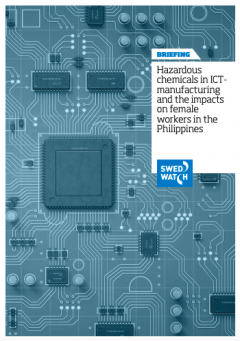Hazardous chemicals in ICT manufacturing and the impacts on female workers in the Philippines
A Swedwatch investigation, published in January 2021, supported by Make ICT Fair.

The University of Edinburgh is a partner in the Make ICT Fair project which aims to improve the lives of workers and those impacted along different stages of the ICT supply chain through research, campaigning, capacity building and advocacy.
Partner organisations produce reports and we share them on our website.
For more information please visit our Make ICT Fair page.
Summary:
Electronics brands must protect workers from hazardous chemicals in the Philippines
Results from a new Swedwatch survey indicate shortcomings in the human rights processes of leading smartphone and laptop brands sourcing from the Philippines. The mostly female factory workers risk severe health risks from exposure to hazardous chemicals and many fear dismissal if they speak out. Despite the Philippines being ranked among the world’s worst countries for workers’ rights, the brands fail to demonstrate adequate awareness of risks to workers’ health and safety.
Disclaimer: This project is organised with the financial assistance of the European Union. The contents of this web page is the sole responsibility of the University of Edinburgh and can under no circumstances be regarded as reflecting the position of the European Union.
Some of the research reports shared on this website have been produced by the University of Edinburgh's partners on the EU-funded Make ICT Fair project. These reports do not reflect the views of the University of Edinburgh, and any queries regarding their content should be addressed to the authors identified within each report.

